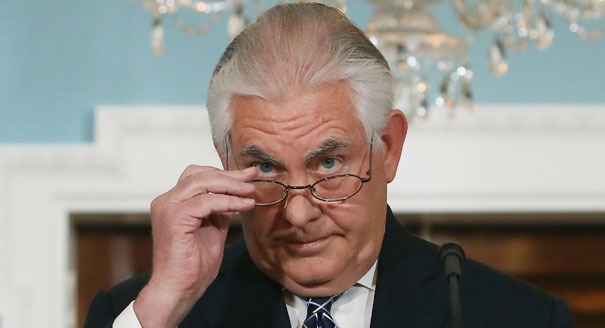Barbara Slavin | Director of the Future of Iran Initiative at the Atlantic Council
U.S. Secretary of State Rex Tillerson’s warnings to international companies not to do business with the Islamic Revolutionary Guards Corps (IRGC) are superfluous. Longstanding U.S. regulations already discourage companies from doing business with Revolutionary Guards-owned or -managed entities and European and Asian firms are scrupulous about performing due diligence before signing new contracts with Iranian enterprises.
What Tillerson should be doing is encouraging foreign companies to do business with the real private sector in Iran. This sector is small but growing and includes family-owned companies that import consumer goods and pharmaceuticals as well as high-tech startups. There is also a large market in Iran for high-quality Western equipment and infrastructure, which has attracted companies including Germany’s Siemens, France’s Alstom and the U.S. aerospace giant, Boeing.
Unfortunately, the Trump administration, by increasing uncertainty over the longevity of the nuclear deal, is acting as a disincentive to the very sort of business it should be encouraging with Iran. It is also undercutting the reform efforts of President Hassan Rouhani, who has been trying to diminish the role of the IRGC in the Iranian economy.
Cornelius Adebahr | Non-resident fellow at Carnegie Europe, focusing on European foreign policy
Companies like to take decisions based on trends, not talk. Their challenge is that U.S. policy towards Iran under President Donald Trump has been mostly boastful and confusing, with little action. So far, the president has signed the necessary waivers to provide sanctions relief each time they were up for renewal, instead of killing the Joint Comprehensive Plan of Action (JCPOA), the nuclear deal with Iran. His most recent refusal to “certify” Iran’s compliance with its obligations under the JCPOA was carefully crafted so as not to violate its terms, while passing the buck to Congress.
Now Trump has stopped short of designating the Islamic Revolutionary Guards Corps (IRGC) as a foreign terrorist organization, while increasing U.S. sanctions against it and calling the IRGC, in a symbolic nod to his own base, “a terror force and militia.” At the same time, both Trump and Secretary of State Rex Tillerson have, in off-the-cuff remarks, ‘generously’ allowed the Europeans to continue to trade with Iran more generally.
As a matter of fact, doing business with the IRGC or its majority-owned companies continues to be sanctionable under U.S. law, even after the 2015 nuclear deal, so companies will be careful not to get involved with it. The problem is that, just as Iran’s government has begun to take on—with public support—the Revolutionary Guards’ opaque economic role, Trump’s move engenders a rally-round-the-flag effect for an entity otherwise cherished for its contribution to national defense.
Sanam Vakil | Professorial lecturer in the Middle East Studies department at the Johns Hopkins School of Advanced International Studies in Bologna, Italy, and associate fellow in the Middle East and North Africa Program at Chatham House, the Royal Institute of International Affairs
U.S. Secretary of State Rex Tillerson’s warning to international companies not to do business with the Islamic Revolutionary Guards Corps (IRGC) is nothing new. The U.S. government has long been warning international companies to avoid doing business with the IRGC, which is heavily sanctioned under U.S. law. His statement serves as a reminder to international companies and European allies that the Trump administration intends to take a stronger line against IRGC economic and political influence around the Middle East. Ultimately, the administration is seeking greater European support for its new Iran strategy that is designed to strengthen the Iran nuclear agreement and contain Iran’s malign regional influence.
Europe, however, disagrees with Washington over how to protect the multilateral nuclear agreement with Iran while also addressing wider regional concerns. Europeans widely believe the nuclear deal is a positive achievement. To them, the deal should be a stepping stone towards greater coordination with Tehran and an opportunity to pressure the Islamic Republic. This difference in strategy will deepen divisions in the trans-Atlantic alliance and weaken Washington’s ability to build a united front against Iran.
International companies are caught in the middle of this standoff. Should European governments act to protect the deal, investment in Iran will continue, albeit at a tempered rate. These debates and pressure will also make the nuclear deal vulnerable to hardline political criticism in Tehran. While the nuclear deal might survive in the short run, without greater unity and commitment from all signatories, especially the United States, it will remain fragile and could not survive the test of time or wider pressure from the Trump administration.
Paulina Izewicz | Research associate in the non-proliferation and nuclear policy program at the International Institute of Strategic Studies
In practical terms, their reaction is likely to be rather limited—if any. The Islamic Revolutionary Guards Corps (IRGC) has been under sanctions since 2007, and international companies have been operating in that environment ever since. The difficulty of doing business in Iran is, of course, that the IRGC controls vast swathes of the economy, including its key sectors. Because of opaque ownership structures, it is not always entirely clear who is involved in any given transaction. But companies have significant incentives to do their due diligence. Because of the risks involved, in case of doubts they are more likely to err on the side of caution than not. As a practical matter, then, American warnings not to deal with the IRGC change little in the companies’ day-to-day operations. In fact, the existing sanctions regime is already so comprehensive that even the recent designation of the IRGC for its support of terrorism under Executive Order 13224 for all intents and purposes only duplicated existing restrictions.








